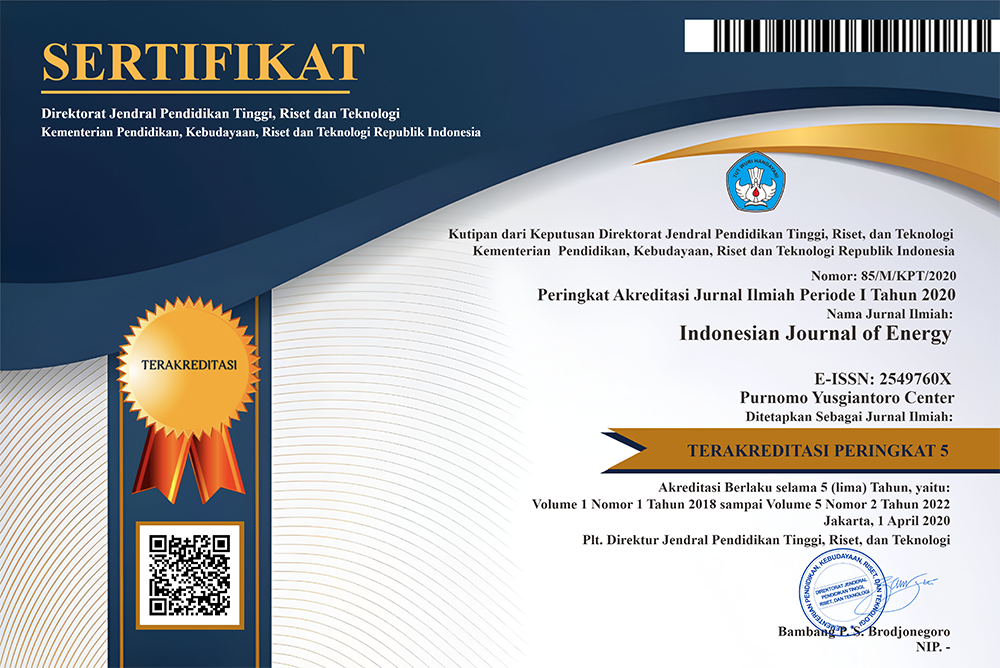The Securitization of Energy Issues from The Perspective of Security Studies
Abstract
Security studies debated the phenomenon of "high politics," such as politics and the military, at the outset of their development. As the study's object, it discusses the arms race, nuclear war, and political coups. Following the end of the Cold War, the economic, social, and environmental sectors became subjects of study in security studies. Not only that, but security studies also address issues that are frequently overlooked, such as energy issues. This is undeniably one of the most pressing issues in security studies today. The energy issue discusses how the country's foreign policy efforts will be carried out in order to avoid the threat of domestic energy scarcity. The inclusion of energy issues in security studies does not happen overnight. Through this scientific article, the author intends to examine how energy issues can become part of security issues. The author employs the concept of securitization to examine the securitization of energy issues from the standpoint of a security study. The author used a qualitative method in this study, with secondary data collection (journals and archive documents) as part of the data collection technique. The discussion of this scientific article has resulted in the securitization of energy issues being divided into three stages. Non-securitization, politicization, and securitization are the stages. Energy issues are not considered security issues during the non-securitization stage. When the energy issue becomes politicized, it poses a real threat that the government must address. Meanwhile, security issues have defined threats in the securitization stage. However, this securitization process will only take place if the audience accepts the threat and the state takes responsibility for mitigation efforts. The author comes to the conclusion that the securitization of energy issues is mutual between the state and the audience (society).
Downloads
References
Alfadh, M. F. (2012). Ketahanan energi Rusia dan kerentanan pasar Asia-Pasifik. Andalas Journal of International Studies (AJIS), 1(2), 123–135.
Aradau, C. (2018). From securitization theory to critical approaches to (in)security. European Journal of International Security, 3(3), 300–305. https://doi.org/10.1017/eis.2018.14
Badaruddin, M. (2016). Indonesia rejoining OPEC: Dynamics of the oil importer and exporter countries. JAS (Journal of ASEAN Studies), 3(2), 116. https://doi.org/10.21512/jas.v3i2.841
Baele, S. J., & Rousseau, E. (2022). At war or saving lives? On the securitizing semantic repertoires of Covid-19. International Relations, October 2019, 1–27. https://doi.org/10.1177/00471178221122957
Baggott, S. S., & Santos, J. R. (2020). A risk analysis framework for cyber security and critical infrastructure protection of the U.S. electric power grid. Risk Analysis, 40(9), 1744–1761. https://doi.org/10.1111/risa.13511
Bahgat, G. (2015). Geopolitics of energy: Iran, Turkey, and Europe. Mediterranean Quarterly, 26(3), 49–66. https://doi.org/10.1215/10474552-3145757
Balzacq, T. (2019). Securitization theory: Past, present, and future. Polity, 51(2), 331–348. https://doi.org/10.1086/701884
BKPM. (2022). Indonesian investment moves to rise after pandemic, first quarter 2022 investment realization: IDR 282.4 trillion. https://www.bkpm.go.id/en/publication/press-release/readmore/2455201/80901
Buzan, B. (1983). People, states, and fear. Wheatsheaf Books Ltd.
Buzan, B., & Hansen, L. (2009). The evolution of international security studies. Cambridge.
Buzan, B., & Weaver, O. (2003). Regions and powers. Cambridge.
Buzan, B., Weaver, O., & De Wilde, J. (1998). Security: A new framework of analysis. Lynne Rienner.
Carvalho, R., Buzna, L., Bono, F., Masera, M., Arrowsmith, D. K., & Helbing, D. (2014). Resilience of natural gas networks during conflicts, crises and disruptions. PLoS ONE, 9(3), 1–9. https://doi.org/10.1371/journal.pone.0090265
Chernysheva, A. M., Gusakov, N. P., Trofimova, A. A., & Bulatenko, M. A. (2019). Diversification of transit risks of oil supplies bypassing Ukraine as the basis of energy security in Europe. International Journal of Energy Economics and Policy, 9(6), 461–468. https://doi.org/10.32479/ijeep.8428
Chowdhury, M. S., Rahman, K. S., Selvanathan, V., Nuthammachot, N., Suklueng, M., Mostafaeipour, A., Habib, A., Akhtaruzzaman, M., Amin, N., & Techato, K. (2021). Current trends and prospects of tidal energy technology. Environment, Development and Sustainability, 23(6), 8179–8194. https://doi.org/10.1007/s10668-020-01013-4
Chung, R. (2017). The securitization of health in the context of the war on terror. National security and global health: The conflict of imperatives. Medicine, Conflict and Survival, 33(1), 32–40. https://doi.org/10.1080/13623699.2017.1327150
Creswell, J. (2007). Qualitative inquiry and research design: Choosing among five approaches. SAGE.
Creswell, J. (2014). Research design: Qualitative, quantitative and mixed methods approaches (4th Ed). SAGE.
Crick, E. (2012). Drugs as an existential threat: An analysis of the international securitization of drugs. International Journal of Drug Policy, 23(5), 407–414. https://doi.org/10.1016/j.drugpo.2012.03.004
Dirioz, A., & Erbil, E. (2020). Regional gas interconnectivity and the implications of trade in liquified natural gas for energy security of non-EU Western Balkan States. Journal of Sustainable Development Law and Policy (The), 10(2), 133. https://doi.org/10.4314/jsdlp.v10i2.1
EIA. (2022). Country analysis executive summary: China. https://www.eia.gov/international/content/analysis/countries_long/China/china.pdf
Erat, S., & Telli, A. (2020). Within the global circular economy: A special case of Turkey towards energy transition. MRS Energy & Sustainability, 7(1), 1–10. https://doi.org/10.1557/mre.2020.26
Gibler, D. M. (2010). Outside-in: The effects of external threat on state centralization. Journal of Conflict Resolution, 54(4), 519–542. https://doi.org/10.1177/0022002710370135
Gökçe, O. Z., Hatipoglu, E., & Soytas, M. A. (2021). The pacifying effect of energy dependence on interstate conflict: A Large-N analysis. Energy Research and Social Science, 78(April). https://doi.org/10.1016/j.erss.2021.102133
Guillaume, X. (2018). How to do things with silence: Rethinking the centrality of speech to the securitization framework. Security Dialogue, 49(6), 476–492. https://doi.org/10.1177/0967010618789755
Hammarberg, K., Kirkman, M., & De Lacey, S. (2016). Qualitative research methods: When to use them and how to judge them. Human Reproduction, 31(3), 498–501. https://doi.org/10.1093/humrep/dev334
Hampton, M. N. (2011). Living in a world of dangers and strangers: Changing EU and German perceptions of threat. German Politics and Society, 29(3), 73–96. https://doi.org/10.3167/gps.2011.290305
Hough, P. (2008). Understanding global security (2nd ed.). Routledge.
IEA. (2022). World energy outlook 2022. https://iea.blob.core.windows.net/assets/830fe099-5530-48f2-a7c1-11f35d510983/WorldEnergyOutlook2022.pdf
Intriligator, M. D. (2015). Energy security in the Asia-Pacific region. Contemporary Economic Policy, 33(1), 221–227. https://doi.org/10.1111/coep.329
Kalkman, J. P. (2019). Understanding the social construction of crises: Comparing the crisis-as-claim model with securitization theory. Journal of Contingencies and Crisis Management, 27(4), 423–424. https://doi.org/10.1111/1468-5973.12277
Karatayev, M., & Hall, S. (2020). Establishing and comparing energy security trends in resource-rich exporting nations (Russia and the Caspian Sea region). Resources Policy, 68(February), 1–10. https://doi.org/10.1016/j.resourpol.2020.101746
Kegley, C. W., & Blanton, S. L. (2011). World politics: Trend and transformation. CENGAGE.
Kilpeläinen, S. (2020). Developing nordic cooperation in renewable electricity policy: Exploring views from Finland and Sweden. Politics and Governance, 8(4), 44–52. https://doi.org/10.17645/pag.v8i4.3408
Klare, M. T. (2013). Energy security. In P. Williams (Ed.), Security studies: An introduction (2nd ed., pp. 535–552). Routledge.
Liedtke, S. (2017). Chinese energy investments in Europe: An analysis of policy drivers and approaches. Energy Policy, 101, 659–669. https://doi.org/10.1016/j.enpol.2016.09.037
Maltby, T. (2013). European Union energy policy integration: A case of European Commission policy entrepreneurship and increasing supranationalism. Energy Policy, 55, 435–444. https://doi.org/10.1016/j.enpol.2012.12.031
Michael, K. (2009). Who really dictates what an existential threat is? The Israeli experience. Journal of Strategic Studies, 32(5), 687–713. https://doi.org/10.1080/01402390903189360
Morgenthau, H., & Thompson, K. W. (2006). Politics among nations (7th ed.). McGraw-Hill Publishing Company.
Morina, F. (2015). Analyzing energy security and sustainable development in Southeast Europe from a multidimensional approach. European Journal of Interdisciplinary Studies, 2(1), 83. https://doi.org/10.26417/ejis.v2i1.p83-86
Naor, D. (2019). The power of neutrality: Lebanon as an oil transit country. Middle East Policy, 26(1), 127–140. https://doi.org/10.1111/mepo.12405
Nyman, J. (2018). Rethinking energy, climate and security: a critical analysis of energy security in the US. Journal of International Relations and Development, 21, 118–145.
OEC. (2022). Oil refined petroleum exports. https://oec.world/en/profile/bilateral-product/refined-petroleum/reporter/fra
Orttung, R. W., & Perovic, J. (2010). Energy security. In M. Dunn-Cavelty & V. Mauer (Eds.), Routledge handbook of security studies (1st ed., pp. 211–220). Routledge.
Ramadhan, I., & Pratiwi, M. (2020). Perluasan kerja sama Shanghai Cooperation Organization (SCO) dalam pandangan teori geopolitik McKinder. Frequency of International Relations, 2(1), 142–163.
Roselle, L., & Spray, S. (2012). Research and writings in international relations. Pearson Longman.
San-Akca, B., Sever, S. D., & Yilmaz, S. (2020). Does natural gas fuel civil war? Rethinking energy security, international relations, and fossil-fuel conflict. Energy Research and Social Science, 70(July), 1–12. https://doi.org/10.1016/j.erss.2020.101690
Saneev, B. G. (2014). Energy sector of eastern Russia: Current state and prospects. Regional Research of Russia, 4(2), 115–120. https://doi.org/10.1134/S2079970514020117
Schiffer, H.-W., Thielges, S., & Unger, C. (2022). Taking stock of the energy and climate profile of Germany and the USA: New potential for cooperation. Zeitschrift Für Energiewirtschaft, 46, 159–174. https://doi.org/10.1007/s12398-022-00330-7
Sheikh, M. K. (2018). Recursion or rejection? Securitization theory faces Islamist violence and foreign religions. Global Discourse, 8(1), 26–38. https://doi.org/10.1080/23269995.2017.1411644
Snyder, H. (2019). Literature review as a research methodology: An overview and guidelines. Journal of Business Research, 104(August), 333–339. https://doi.org/10.1016/j.jbusres.2019.07.039
Sun, H. (2014). China-Venezuelan oil cooperation model. Perspectives on Global Development and Technology, 13(5–6), 648–669. https://doi.org/10.1163/15691497-12341322
Taibi, E., Gualberti, G., Bazilian, M., & Gielen, D. (2016). A framework for technology cooperation to accelerate the deployment of renewable energy in Pacific Island Countries. Energy Policy, 98, 778–790. https://doi.org/10.1016/j.enpol.2016.03.009
Urban, F., Siciliano, G., Wallbott, L., Lederer, M., & Dang Nguyen, A. (2018). Green transformations in Vietnam’s energy sector. Asia and the Pacific Policy Studies, 5(3), 558–582. https://doi.org/10.1002/app5.251
Van Rythoven, E. (2019). The securitization dilemma. Journal of Global Security Studies, 0(0), 1–16. https://doi.org/10.1093/jogss/ogz028
Williams, P. (2013). Security studies: An introduction. In P. Williams (Ed.), Security studies: An introduction (2nd ed., pp. 1–12). Routledge.
Wishnick, E. (2010). Dilemmas of securitization and health risk management in the People’s Republic of China: The cases of SARS and avian influenza. Health Policy and Planning, 25(6), 454–466. https://doi.org/10.1093/heapol/czq065
Yergin, D. (2011). The quest: Energy security and the remaking of new world. The Penguin Press.
Yu, J., & Dai, Y. (2012). Energy politics and security concepts from multidimensional perspectives. Journal of Middle Eastern and Islamic Studies (in Asia), 6(4), 91–120. https://doi.org/10.1080/19370679.2012.12023215
















